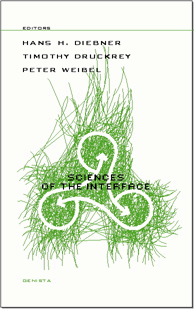Genista Wissenschaft
Sciences of the Interface

Hans Diebner, Timothy Druckrey und Peter Weibel (Hrsg)
Sciences of the Interface
Proceedings of the International Symposium
Including one audio CD
29,- Euro
ISBN 3-930171-26-0
Preface
Interface is one of these hermeneutically grown concepts that refuses to be exactly defined. In computer sciences and robotics it is in vogue to speak of interfaces, especially of man-machine-interfaces. Everybody has a clear intuition what is meant by interface in this context. The keyboard or the monitor of a computer, for example, are interfaces which transform between different states or representations. However, also parts of software can be called interface. Consider, for example, an interface that allows for a communication between two or more programs written in different languages. In contrast to the hardware case, the latter interface cannot be localized anywhere. It rather is the functionality behind it that allows to speak of an interface.
In a first approach we can say that the concept of an interface has to do with transformations of states or representations and/or a communication between parts of a compound system. This in turn highly depends on the scale at which the system is viewed. As a simple example consider a computer monitor. This is a cascade of interfaces that transforms internal electro-magnetic states via data buses, oscilloscope, fluorescent material etc., to electro-magnetic states in the visuell range of wavelenghtes. A purist may write down a (partial) differential equation of the whole thing on a microscopic level where the notion of an interface seem to become rather arbitrary.
It seems, that the intuitive notion of an interface is resided on the (human) scale of cognition. In a sense, it is a relativistic concept. In the natural sciences, so far, the notion of an interface with respect to human cognition has been widly ignored or avoided. A Laplacian demon, the metaphor for determinism in form of a non-relational super- or exo-observer may not need the interface-concept. However, the humans as intrinsic observers ask themselves ever since the ancient greeks whether there is a difference of the world in our head -- the shadows on the cave's wall - and the objective outer world. A question which is allowed to inquire in arts and humanities ...
The symposium Sciences of the Interface and the proceedings in hand are to honor Otto E. R�ssler on the occasion of his 60th birthday. He focused on the interface in his work and stimulated and provoked a lot of scientists to re-think the interface. The syposium has been held to throw a further glimpse on the interface concept. We also hope to contribute to "close the ranks" between artists and natural scientists.
We express our deep gratitutes to all authors for taking a large amount of effort and time to prepare their contributions. Parts of these proceedings will we reprinted in a book on interface intended for a broader audience.
Karlsruhe, December 2000
Hans H. Diebner, Timothy Druckrey, Peter Weibel